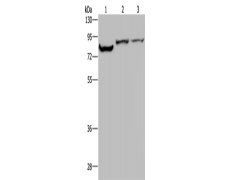|
Background: |
This gene encodes a voltage-gated potassium channel required for repolarization phase of the cardiac action potential. This protein can form heteromultimers with two other potassium channel proteins, KCNE1 and KCNE3. Mutations in this gene are associated with hereditary long QT syndrome 1 (also known as Romano-Ward syndrome), Jervell and Lange-Nielsen syndrome, and familial atrial fibrillation. This gene exhibits tissue-specific imprinting, with preferential expression from the maternal allele in some tissues, and biallelic expression in others. This gene is located in a region of chromosome 11 amongst other imprinted genes that are associated with Beckwith-Wiedemann syndrome (BWS), and itself has been shown to be disrupted by chromosomal rearrangements in patients with BWS. Alternatively spliced transcript variants have been found for this gene. |
|
Applications: |
ELISA, WB |
|
Name of antibody: |
KCNQ1 |
|
Immunogen: |
Fusion protein of human KCNQ1 |
|
Full name: |
potassium voltage-gated channel, KQT-like subfamily, member 1 |
|
Synonyms: |
LQT; RWS; WRS; LQT1; SQT2; ATFB1; ATFB3; JLNS1; KCNA8; KCNA9; Kv1.9; Kv7.1; KVLQT1 |
|
SwissProt: |
P51787 |
|
ELISA Recommended dilution: |
1000-2000 |
|
WB Predicted band size: |
75 kDa |
|
WB Positive control: |
HT-29 cells, mouse kidney and heart tissue |
|
WB Recommended dilution: |
200-1000 |

 購物車
購物車 幫助
幫助
 021-54845833/15800441009
021-54845833/15800441009
